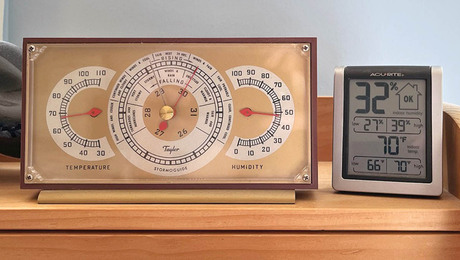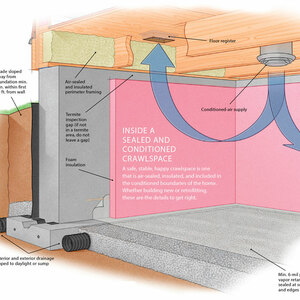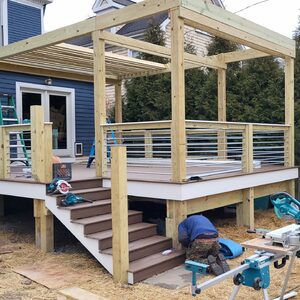*
a termite inspection of a residence we plan to buy indicates a large infestation. What do I do, how much repair do I need to do? HELP!!
Discussion Forum
Discussion Forum
Up Next
Video Shorts
Featured Story

Source control, ventilation, and filtration are the keys to healthy indoor air quality. Dehumidification is important too.
Featured Video
How to Install Exterior Window TrimHighlights
"I have learned so much thanks to the searchable articles on the FHB website. I can confidently say that I expect to be a life-long subscriber." - M.K.

















Replies
*
The inspection report should give you the scope of the infestation found. You might want to have another inspection done and accompany the inspector for a first-hand view of the damage and a feel for what will have to be replaced. If you cannot, or will not, do the repairs yourself, get a contractor in for an estimate of cost of repair. Allot maybe an extra 50% for the unseen and unseupected damage that will turn up when things are opened up. Find out what the extermination costs will be, both the initial process and the periodic applications. What price break is the seller willing to give you? Or is it the seller's responsibility to do the repairs? If it is, is the seller only going to perform minimal repairs, possibly leading to further work down the road? Ask yourself if you really want the house this badly.
*Being in the termite capital of the world, DO NOT BUY THE HOUSE, all I can offer
*Scott,Don't panic (unless, maybe, if you live near Johnnie)The pest report probably won't give you enough info to evaluate, you'll ned to get a contractor who specializes in those repairs.Different areas of the country have different typres of termite and levels of activity.In NW Ohio, I see a fair # of home w/ evidence of termites, but less than 1/4 or so need any extensive repairs. In other areas, from what I hear, if a colony dreams about your house 1 nite, it's time to call out the bulldozers
*I do extensive termite damage repairs.Do not buy the house if it has a current infestation. James DuHamel
*If you still have it in mind to buy this house, you better have a REALLY good Real Estate lawyer.
*I'm curious as to where the other respondents are from.My understanding is that the type of termite and degree of damage they typiclly do varies from region to region and house type to house type.What they say is, I'm sure, appropriate to where thewy are, but more info is needed to access the applicability of their answers.In reading the initial question, I do note that the infestation was described as "large" which should give one pause, of course.
*Many of the Real Estate contracts I've seen require that the problem be corrected before the sale. It usually makes the seller responsible for treatment to get rid of the termites and repair any damage. I also recall that the bank makes this a requirement for getting the loan.
*Don't buy it. The place I rent has had major rework done, been seriously treated twice--- guess what swarmed from the bathroom closet this morning? Termites. Again. This has been nothing but heartache and major bucks for the new landlord that bought the place 3 years ago.(Yes, it was inspected, told at the time it was minor, they sued, but I never found out if they recouped any of the losses)
*Check it out if you want, but I can tell ya from experience that trying to get rid of the termites will be a major expense, very time consuming, and not effective at the end. Most of the treatments that are used by major termite pest control companies today are not very effective. They do not kill anything immediately, and most termites will simply move over to a better part of the house anyway. I deal very closely with pest control companies. What I have seen, and been taught by them is that they only treat the area between the house and the outside. They are trying to prevent the termites from gaining access to the home. Their philosophy is that if the termites cannot get back to the ground for moisture, they will soon die. So, they treat the areas that will stop the termite from getting back to the ground. The termites are still very much alive in the wall cavities, inside the wood, etc... Mistake here on the part of the pest control people is the fact that MOST (not all) termite colonies inside a home do not need to get back to the ground for moisture. The house usually has someplace that leaks moisture into the wall cavity (either from siding leaks, roof leaks, or somewhere that moisture is penetrating the wall). This moisture source inside allows the termites to stay nice and safe and well fed. These are NOT Formosan termites I am talking about. Here, whenever I open up a wall and actually find live termites in a home that has been treated for years, the pest control companies come out, take a look, and go back outside to spray. Texas law now forbids a pest control company to spray a termite killing agent INSIDE the home, even in an open wall cavity. They can go outside and spray all day long, and even treat the ground, but must not spray in the occupied space. The whole idea of a pest control company's treatment of termites is to create a barrier that keeps them away from the home. Once infested, it is almost impossible to get them all out in a reasonable amount of time. Termites can do some serious damage in a short period of time. Just a thought...James DuHamel
*James, in your experience, what effect, if any, does tenting a house and fumigating have on termite infestations?
*Hey Don,It really depends on the house, the pest control company, and the degree to which they actually fumigate.Older houses that are not so air tight benefit more than newer, tighter homes. I have seen a few that were so tight that hardly any gas at all made it into the wall cavities. The company had to drill holes in the outside siding to let the gas penetrate. I have done repairs to homes AFTER the tenting/fumigating and found live termites. The homeowners were quite pissed, but there was nothing they could do. The pest control company told them that it would take quite some time for the termites to actually die. What tenting basically does now is simply force the pests (termites and every other living thing in the house) to vacate and seek safety outside. Termites will simply go back into the earth where the barrier treatment is supposed to kill them, or at least keep them from getting back in. Ants, rats, roaches, spiders, etc... usually just die in place because they cannot find an escape route quickly enough.Tenting is VERY expensive, (average 1 story home here runs about $3,500) and has a less than average success rate. The EPA has made the use of chemicals which do a good job illegal. The stuff they have to use now is only so so in effectiveness, and it will start getting worse as the rules get more stringent about the use of pesticides. I personally wouldn't spend the money on tenting in my area, but your area might have better results. Regional differences may very well play a major role in the effectiveness of such techniques.James DuHamel
*Seems to me some years back I remember reading about some experimental techniques where they listened for the sound of termites gnashing with an electronic stethoscope and then zapped the area with microwaves. I just did a quick web search and several companies advertised that they offered special microwave equipment for zapping termites or offered the actual service of nuking them in a house.I also remember something about trying to freeze the little munchers with liquid nitrogen or something, however a quick search on that topic drew naught. Anyone hear anything about the effectiveness of roasting the little beggers with an industrial strength microwave. (It certainly should be able to do in any that have pacemakers, and you might even be able to eat them for lunch afterwards, after all, Chimps find them a delicacy...)
*CaseyThere is one company that seals the house and heats it up. I read about in in FHB or JLC a couple of months ago. Then I saw it some place else. They still are "learning" about what all needs to be removed first, to keep them from getting melted.
*Yeah, I remember about the whole house heating. The advantage of the microwaves or liquid nitrogen would be that if things were slightly miscalculated, it should destroy a somewhat smaller area...
*Thanks to all for the information on the termites. I have not used a service like this before and have found it very useful. I realized that my original message was lacking in alot of detail: The house is in Charlotte, North Carolina. The structural inspector couldn't finish the inspection in the attic b/c there were so many termites swarming and going after his light, the hardwood flooring was very soft in the dining room, and confirmed that the joist were infested, termites were pouring out a hole in the wall of the dining room like bees at a beehive, there was standing water and significant dryrot in the crawl space. Wow, now that I've written down a portion of the issues, I guess I'll pass on this one! Thanks again to all.
*I had my place tented, missed by one week the deadline for getting the good methyl bromide, and had to settle for EPA tolerated Vikane. The price was $1750 for a 3124 sq. ft. two story plus garage. The guarantee is that if I find live termites again within two years, they'll do it again at no additional charge. The guy who did the high work on tenting took one look at the place and said "hey, great, this is going to be easy." It turns out the reason was that I have these two topped off Cypress trees at the front corners of the house. He used them to stand on while he adjusted the tenting, both feet on a 5 inch circle 30 feet up. I've decided not to try that myself.... ;-)-- J.S.
*Scott --It sounds like it should be OK for you to buy the house. Just take the value of the vacant land, subtract the cost of demoing the existing structure, and that's your price. If they take it, you have a reasonable deal.-- J.S.
*With that further info, I've changed my mind: Panic!
*
a termite inspection of a residence we plan to buy indicates a large infestation. What do I do, how much repair do I need to do? HELP!!